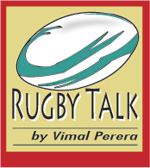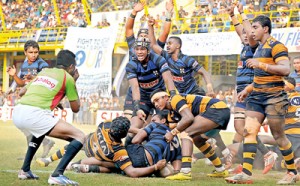Referee! Let the game flow why not?
View(s): A most used comment whenever a referee flies across to be in charge of a match in Sri Lanka is to say that the “referee, let the game flow.” At times I wonder what that means. The simple answer I have is that probably the referee did not stop the game if it was not clear and obvious or because it was not material. Clear and obvious is a referee principle that is applied to all refereeing decisions, including forward passes and knock-ons.
A most used comment whenever a referee flies across to be in charge of a match in Sri Lanka is to say that the “referee, let the game flow.” At times I wonder what that means. The simple answer I have is that probably the referee did not stop the game if it was not clear and obvious or because it was not material. Clear and obvious is a referee principle that is applied to all refereeing decisions, including forward passes and knock-ons.
As an example take the case of knock-on. A knock-on occurs when a player loses possession of the ball and it goes forward, or when a player hits the ball forward with the hand or arm, or when the ball hits the hand or arm and goes forward, and the ball touches the ground or another player before the original player can catch it. ‘Forward’ means towards the opposing team’s dead ball-line.
Let us say from a tackle the ball comes back to the fly-half just outside his 22. He then makes a long kick to his left where a player inside the 22 tries to catch the ball but he drops it. It is not a clear knock forward and looks like the ball went over the shoulder and forward as the camera shows. The referee in such a situation will not being the same angle as the camera as he possibly is a way away from the ball kicked almost 50 metres.
 At this point the referee should be able to judge whether ball went forward. If it is not clear then don’t blow it. Try that in Sri Lanka and you will see crowds including coaches shouting that the referee did not see a knock-on. The question is if the ball did first go back and then forward to satisfy the law on knock-on. What possibly follows is a complaint that that a referee did not give knock-on or that referee did not give a knock-on and the name game goes on including calling a referee a cheat.
At this point the referee should be able to judge whether ball went forward. If it is not clear then don’t blow it. Try that in Sri Lanka and you will see crowds including coaches shouting that the referee did not see a knock-on. The question is if the ball did first go back and then forward to satisfy the law on knock-on. What possibly follows is a complaint that that a referee did not give knock-on or that referee did not give a knock-on and the name game goes on including calling a referee a cheat.
The referee on the field cannot go on guesswork but it has to be clear and obvious. In and around the rugby fields in Sri Lanka there is so much shout on guess work by spectators as well as coaches who may or may not know the law. I believe when considering the payments they get and are virtually professional coaches and know the law. But there is so much guesswork that makes them shout and abuse referees. The end result is that referees become conscientious and painstaking in decision making that they will whistle for what looks an infringement. Then who makes local referees stop often and not let a game flow. The answer probably is to have a look at the mirror.
In a recent match a tee was taken while a player took a tap and scored. The immediate run by the coach was to the substitution bench attacking for not seeing the kicking tee being taken. Did this tee-bearing-runner from the bench go beyond the five metre? Did the opposite players stop playing because the tee was brought? Finally was it clear and obvious to the referee that the tee was brought and was it material. The bench reacts and the Sub Official runs to the referee and the try is disallowed and the law is applied to the letter. If you talk of the clear and obvious the next question would be to ask where in the law book it says so. This is a principle of refereeing just as much as continuity is a principle of playing the game.
I have seen and heard comments about some of the Japanese referees who have been in charge of the whistle in Sri Lanka. Taku Otsuiki is one of them who according to pundits of local rugby is not the best has been found to be very good by World Rugby and has been included in the Panel of Referees for the Olympics which is dream for anybody to be in.
Recently there was a Sri Lankan who is a referee from the London Society of Rugby Referees officiating in the match between St. Joseph’s and Wesley who was at the receiving end of shouting when he did not blow what was not clear and obvious and or not material. He, in my view, let the game flow and continue and there was less stoppages and penalties. This was not to the liking of some who sort to jeer as he walked out of the field.
For the second time in two weeks I saw a coach and or coaches being warned of bad bench behaviour and it is time the respective authorities to take note before it escalates. This was shouting because a player got up with the ball. My advice is to read the law; ball on the ground no tackle and revisit the issue. I also saw a lack of the protocol to see a coach attempting to send a fitness trainer to talk to the referee and the referee sent him off the ground admonishing that he will be removed from the perimeter if he comes again. The law is that the referee may consult the Assistant Referee but not any others. Then it follows simply that you cannot talk to a referee during a match.
The one-minute water break is practiced in the current school season. This is a good thing with the heat wave. This one-minute is for replacing body fluid. I have seen the one-minute taken to provide coaching points and giving less time for water. The referees have started to say no coaches on field at the one-minute break. The next you find is that coaches get players to the touch line and stay out of the field giving instructions. Why is it that the simple logic of one-minute is for player safety and not a time for coaching tips and thus forcing more than a minute and have match officials having to shoo the team back to restart the game.
* Vimal Perera is a former player, coach, referee and an IRB Accredited Referees’ Educator


